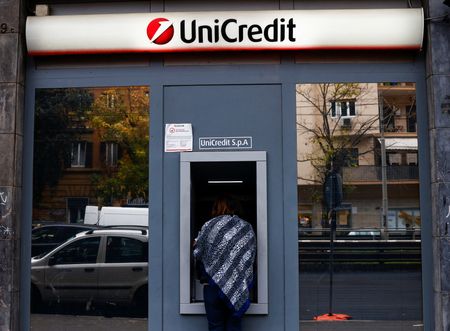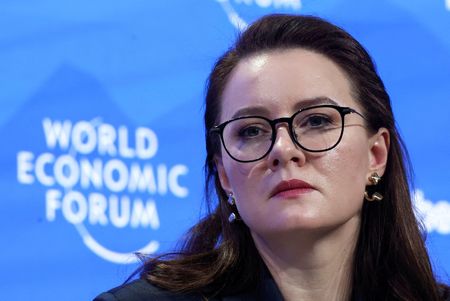By Giuseppe Fonte and Sudip Kar-Gupta
ROME (Reuters) -A clash between Italy and the European Commission over whether Rome has the right to impose tough conditions on domestic bank mergers escalated on Monday, when a warning letter from Brussels drew a terse response from the Italian deputy prime minister.
The letter said imposing certain conditions on UniCredit’s planned bid for Banco BPM could breach EU law, marking a step towards a formal infringement procedure against the Italian government.
Brussels challenged a decree issued by Prime Minister Giorgia Meloni on April 18 which used the government’s so-called “golden power” to rein in the deal. The Commission said its next steps would depend on Rome’s response.
Deputy Prime Minister Matteo Salvini, from the far-right League party, replied that Brussels should concentrate on negotiating a trade deal with the United States and keep out of how Italy intervenes in the banking sector.
“Italy can and must legislate as it sees fit without anyone in Brussels daring to intervene,” Salvini told reporters.
Earlier, a brief statement from Prime Minister Giorgia Meloni’s office had appeared more conciliatory, promising to respond to the Commission “in a collaborative and constructive spirit.”
Applying the golden power regulation – aimed at shielding strategic assets – Italy told UniCredit to halt its activities in Russia, except for payments to Western companies, by early 2026, among other conditions.
Rome previously told the EU that UniCredit’s exit from Russia was needed to prevent savings collected by Banco BPM from benefiting Moscow’s economy as it continues its war against Ukraine.
But Brussels told Rome its argument was not sufficiently supported.
“The decree may also be incompatible with other provisions of EU law, including on the free movement of capital and on prudential oversight by the European Central Bank.”
The letter comes after an Italian court on Saturday scrapped some of the conditions Rome had imposed on UniCredit, but confirmed the validity of the one on Russia.
MORE UNCERTAINTY
The court ruling has increased uncertainty around the bid and raises the stakes in UniCredit’s tussle with the government.
Economy Minister Giancarlo Giorgetti, a leading League member, said in May he would resign if he were overruled on the UniCredit-BPM issue.
Both the Treasury and UniCredit have said Rome will need to issue a new decree in the light of Saturday’s court ruling.
The government could present an amended decree as early as this week to prevent UniCredit from seeking a suspension of the bid through a formal request to market watchdog Consob, a source familiar with the matter told Reuters.
So far only 0.14% of the entitled shareholders have accepted the offer, which ends on July 23.
At the current price, UniCredit’s 14.5 billion euro ($16.95 billion) all-share bid for BPM is below the latter’s 15.6 billion euro market value.
($1 = 0.8553 euros)
(Sudip Kar-Gupta reported from Brussels; Editing by Bernadette Baum and Gavin Jones)









